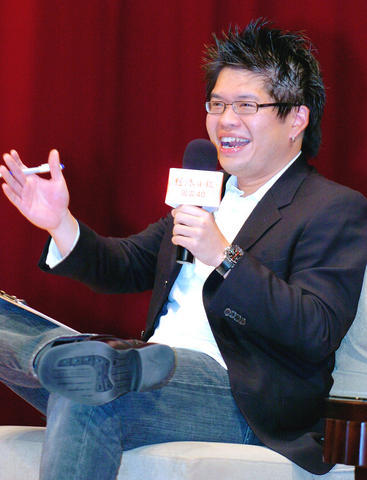In his first public speech in Taiwan, popular video-sharing site YouTube co-founder Steve Chen (
His speech attracted hundreds of local YouTube fans who were keen to pick the brain of one of the most prominent Internet hotshots.
Born in Taiwan, Chen, 29, moved to the US with his parents when he was eight years old.

PHOTO: LIAO CHEN-HUEI, TAIPEI TIMES
Wearing a white shirt and jeans, and sporting short, spiky hair and an earring in both ears, Chen ascribed YouTube's success to video being a cross-cultural communication tool "that can break the language barrier."
Chen created YouTube with his friends Chad Hurley and Jawed Karim to share video clips they had made during a gathering, he recalled.
Launched in February 2005 in Hurley's garage, YouTube has quickly accumulated high traffic volumes and became one of the world's most visited sites.
It was acquired by Internet titan Google Inc last October for US$1.65 billion.
With half of its users living outside the US, YouTube may develop different language versions for the site, including a Mandarin version for Taiwan, to boost its appeal to global users, he said.
Chen delivered the speech at a forum in Taipei which was also attended by other industry leaders, including Chunghwa Telecom Co (
Chen said the Internet was moving from the so-called Web 2.0 era -- user-generated content in a user-oriented environment -- to the Web. 3.0 era, in which users are no longer tied to their PCs, while enjoying much more personalized and individualized content and services on the go.
Going mobile
To follow the trend, YouTube will go mobile by the end of next year, allowing users to share video clips on handsets and mobile devices, he said.
The coming of the Web 3.0 era means more bandwidth, faster transmission speeds, and more content with more diversification to serve increasingly complicated user needs, Hochen said.
To achieve these goals, significant investment in infrastructure is needed, he said. While the nation's largest telecom company tries to build more base stations, it has met constant protests from local residents, he said.
Another obstacle is concerns over the relevant business models, Hochen said. Web 2.0 sites generate income mainly from advertising and subscription, which does not seem to ensure a return on investments in the short term, he said.
Kuei shrugged off the concern, saying that huge advertising revenues were ready to pour into Web 2.0 sites, as they could better target specific customer groups from different budget segments.
The total advertising budget in Taiwan last year was between NT$40 billion (US$1.21 billion) and NT$50 billion, which is more than many public companies' annual revenues, Kuei said.
One challenge the speakers seemed to agree on is piracy. In China, for example, there are already more than 200 video-sharing sites copying YouTube's business model.
But as long as YouTube can remain a destination offering the most content catering to a majority of users, users will stay with the site, Chen said.

Intel Corp chief executive officer Lip-Bu Tan (陳立武) is expected to meet with Taiwanese suppliers next month in conjunction with the opening of the Computex Taipei trade show, supply chain sources said on Monday. The visit, the first for Tan to Taiwan since assuming his new post last month, would be aimed at enhancing Intel’s ties with suppliers in Taiwan as he attempts to help turn around the struggling US chipmaker, the sources said. Tan is to hold a banquet to celebrate Intel’s 40-year presence in Taiwan before Computex opens on May 20 and invite dozens of Taiwanese suppliers to exchange views

Application-specific integrated circuit designer Faraday Technology Corp (智原) yesterday said that although revenue this quarter would decline 30 percent from last quarter, it retained its full-year forecast of revenue growth of 100 percent. The company attributed the quarterly drop to a slowdown in customers’ production of chips using Faraday’s advanced packaging technology. The company is still confident about its revenue growth this year, given its strong “design-win” — or the projects it won to help customers design their chips, Faraday president Steve Wang (王國雍) told an online earnings conference. “The design-win this year is better than we expected. We believe we will win

Chizuko Kimura has become the first female sushi chef in the world to win a Michelin star, fulfilling a promise she made to her dying husband to continue his legacy. The 54-year-old Japanese chef regained the Michelin star her late husband, Shunei Kimura, won three years ago for their Sushi Shunei restaurant in Paris. For Shunei Kimura, the star was a dream come true. However, the joy was short-lived. He died from cancer just three months later in June 2022. He was 65. The following year, the restaurant in the heart of Montmartre lost its star rating. Chizuko Kimura insisted that the new star is still down

While China’s leaders use their economic and political might to fight US President Donald Trump’s trade war “to the end,” its army of social media soldiers are embarking on a more humorous campaign online. Trump’s tariff blitz has seen Washington and Beijing impose eye-watering duties on imports from the other, fanning a standoff between the economic superpowers that has sparked global recession fears and sent markets into a tailspin. Trump says his policy is a response to years of being “ripped off” by other countries and aims to bring manufacturing to the US, forcing companies to employ US workers. However, China’s online warriors